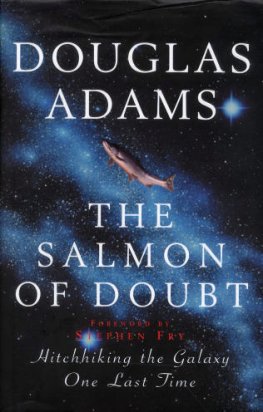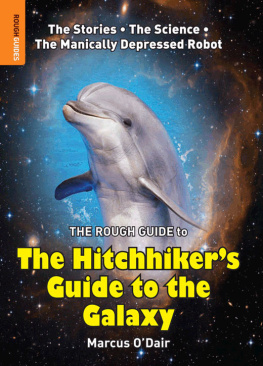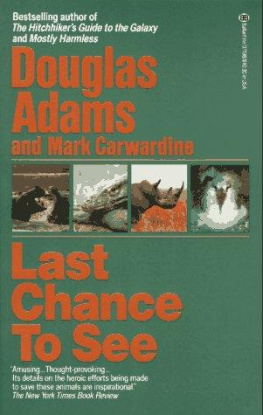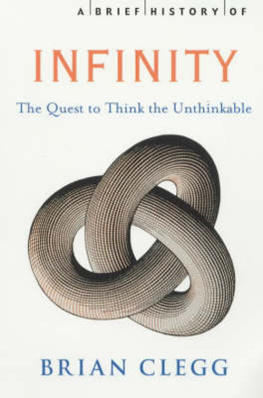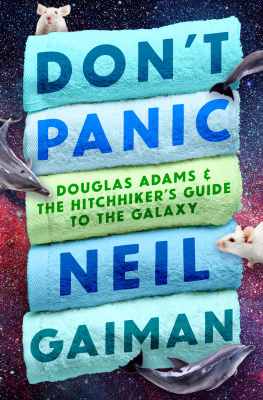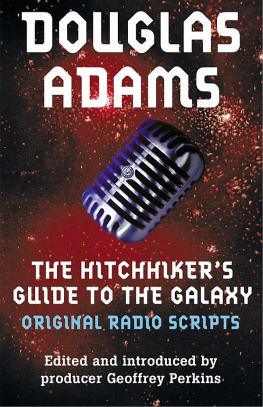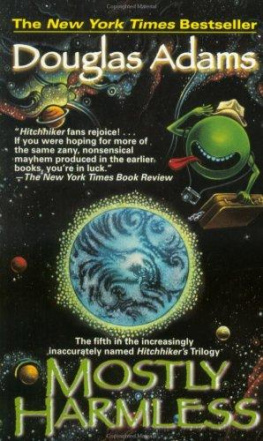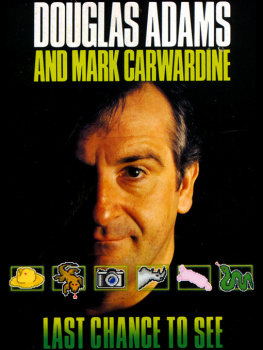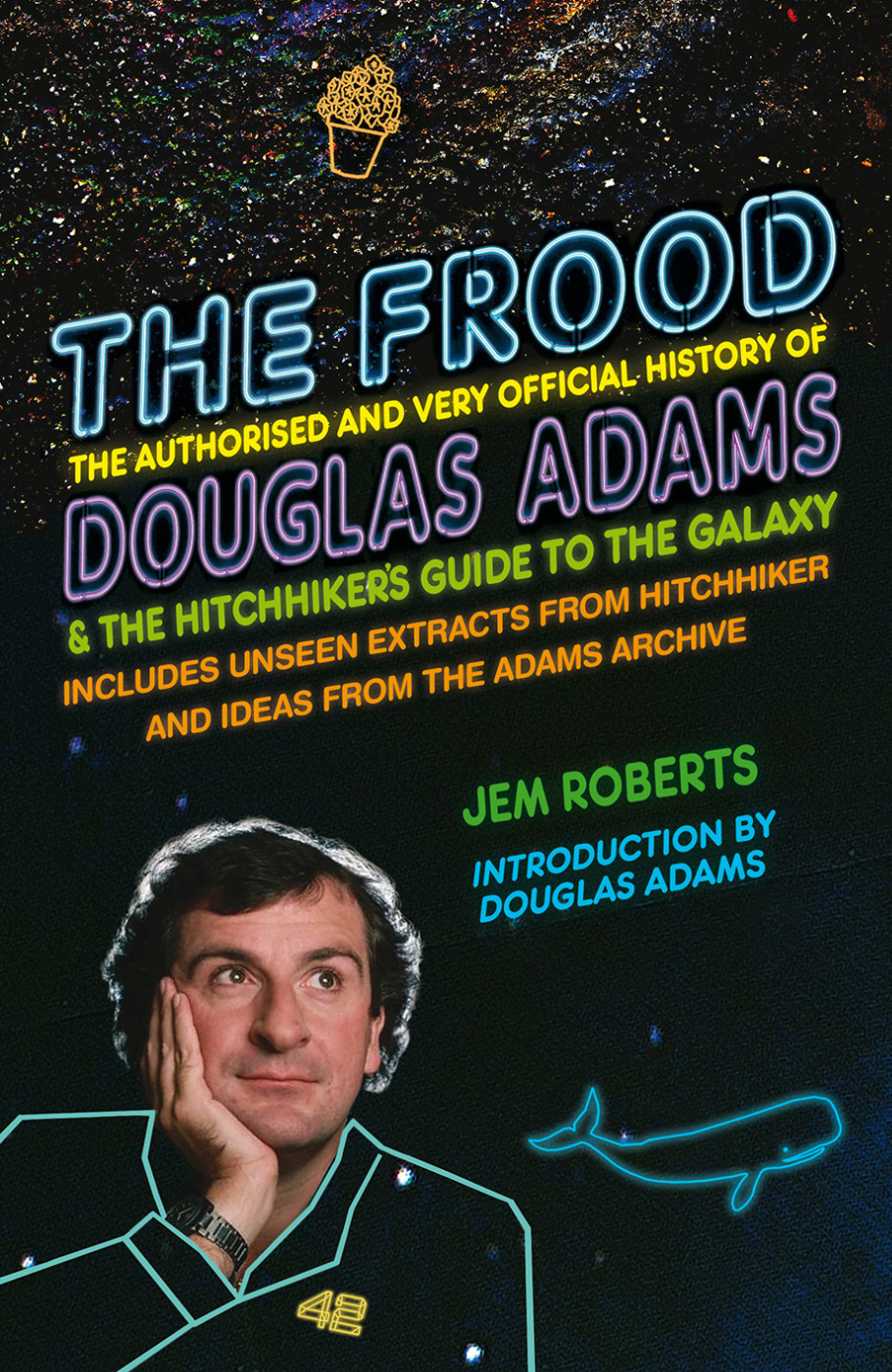CONTENTS
These extracts are referenced in the main text by their number in the Appendices
About the Book
As a wise ape once observed, space is big. Really big. You may think its a long way down the road to the chemists, but thats just peanuts to space. Luckily, we have the luxury of being able to step back, gaze up at the stars and take it all in, a few millennia after the events were looking at have happened.
Similarly, Douglas Adams was also big. Really big. Not just in the sense of his dwarf-scaring stature, but as the most successful sci-fi humorist of all time, the creator of one of the biggest phenomena in British publishing history The Hitchhikers Guide to the Galaxy . From Radio 4 comedy sensation to best-selling books to the Hollywood movie, Hitchhiker was a monster that gave Adams the fame and wealth he always wanted but which he felt haunted by for the rest of his life.
In The Frood , comedy historian Jem Roberts invites you to step back, thirteen years after Adams sudden and shocking death, for a fresh look at the man and his globally adored creation, with the full approval and participation of Douglas family and closest friends. Besides bringing the Hitchhiker story right up to date, for the first time Adams private archives have been examined, and many previously unseen ideas, extracts, stories and jokes have been reproduced here, for fans to share and enjoy, as a celebration of the froodiest odyssey in British comedy history.
Towels at the ready...
About the Author
Jem Roberts was born in Ludlow, Shropshire, at around the time of Hitchhikers first repeat in 1978. He studied English Literature, Film & Television at the University of Wales Aberystwyth, while embarking on a long career in magazines, beginning as a videogame journalist and taking in work for titles as disparate as SFX , Pokmon World , DVD Review , XBW and the 2003 Disney & Me Summer Special .
Writing for the cream of comedy fanzines including Publish & Bedazzled and Kettering led to Barry Cryers suggestion that he extend an article on the Im Sorry legacy into a full official guidebook The Clue Bible: The Fully Authorised History of Im Sorry I Havent a Clue , published by Preface in 2009. When asked to consider a follow-up, the filling of one shamefully glaring gap on the comedy history shelves was most pressing, and so The True History of The Black Adder followed in 2012.
Jem lives in Bath, where he mulls over a fourth work of comedy history. When not actually going on about comedy, he often performs something quite like it both solo and with merry band The Unrelated Family, as well as rewriting and performing stories from British folklore, as Brother Bernard.
Find out more at www.jemroberts.com
Also by Jem Roberts
The Fully Authorised History of Im Sorry I Havent a Clue
The True History of the Black Adder
For Janet, Sue, Jane, James and Polly
In memory of Peter, Geoffrey and The Frood
DO NOT READ THIS INTRODUCTION
You can if you like, but you dont have to. I hardly ever read the introductions to books, and suffer from occasional twinges of anxiety about it, just as I still sometimes do if I step on the cracks in the pavement. Do not worry. You can skip the introduction entirely, if you like, and the bears will not get you.
Ive been asked to try out a wonderful new machine which interviews authors automatically and means that journalists wont need to bother to leave the bar at all in future. The inventor tells me that the job of programming it turned out in the end to be a lot simpler than he had anticipated. He had at first gone to all the trouble of devising elaborate parsing routines to analyse all the questions that journalists might ideally ask, select them, merge them, and arrive thereby at a kind of quintessential synthesis the perfect author interview.
When this unexpectedly turned out to consist of complete silence he had to pause and reconsider his criteria. Perhaps perfection was too noble an objective, and so a little pragmatic workaday-ness was introduced into the program. A little too much, in fact. When the machine was at length prised out of the local pub and sobered up with a couple of quick zips through the Sieve of Eratosthenes, it announced that it had lost patience with the whole silly exercise since it should be perfectly clear to any idiot (though not, it admitted, to its inventor, who was a genius and therefore easily fooled) that journalists all asked exactly the same questions anyway. The program should be as simple as possible.
So the inventor rewrote the program along the simplest possible lines (simple, that is, by his standards remember, we are speaking here of genius), until the machine seemed satisfied with itself. Yet the inventor remains anxious. He suspects the machine of having got a kind of satirical glitch from somewhere but, like all malfunctioning machines, it only goes wrong whenever anybody capable of putting it right is not watching. He has asked me to field test it and treat it very gently, as its a prototype. I have agreed, but I dont like the way the thing looks at me at all. Luckily I am prepared
| INTERVIEWING MACHINE: | Well, Douglas. I thought that instead of asking the same old obvious questions, wed do something a little different and get back to basics. So tell me where did you first get the idea? |
| DOUGLAS: | Er, well, its interesting you should ask that, interviewing machine. The story goes that I first thought of the idea in 1971 while lying drunk in a field in Innsbruck |
| IM: | So you thought it all up just like that, lying in a field in Spain? |
| DOUGLAS: | Well, not all of it, no. Just the title. It was Innsbruck, actually, in Austria. |
| IM: | Are you surprised by its success? |
| DOUGLAS: | Um, its hard to say, interviewing machine. Its been growing since 1978. Its difficult to say youve been surprised gradually over a period of seven years. |
| IM: | Seven years? Well, its come a long way since that field in Spain. Has it made any difference to your life? |
| DOUGLAS: | Er, yes. I think it was in Austria in fact. That was in 1971. I just thought of the title then. I didnt start writing it till the end of 1976. And yes, if I hadnt been doing this continually for the last seven years, I would have been doing something different. Since I dont know at all what that would have been its not easy to say what the difference is. |
| IM: | Where do you get all your ideas from? |
| DOUGLAS: | I wish I knew, interviewing machine. The dull truth is that you just have to sit there and think of them. If you cant think of them you just have to sit there or think of an excuse for doing something else. Thats quite easy. Im very good at thinking of reasons for having a quick bath or a Bovril sandwich |
| IM: | Which planets do you visit most often? |
| DOUGLAS: | I beg your pardon? |
| IM: | Its a whacky question. You can answer it in a whacky way. Just say something crazy. It will be fun. |
| DOUGLAS: | What? |
| IM: | Have you always been funny? |
| DOUGLAS: | Er, well that is |



